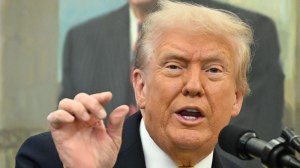The Republican Royals
The last week of 2007 was consequential for democracy in South Asia.

The last week of 2007 was consequential for democracy in South Asia. Nepal began its transition to a ‘federal democratic republican state’, by abolishing the monarchy, and so persuading the Maoists to rejoin the government. In a historic first, the people of Bhutan voted to elect members of the upper house of Parliament, a first step towards democracy sponsored and guided by none other than the monarch himself! Over the next few months, both countries are expected to become more robustly democratic with the election of Nepal’s constituent assembly in April and elections to the lower house of the Bhutanese parliament in February.
In contrast to the republican turn in Nepal and Bhutan, the assassination of Benazir Bhutto in Pakistan was an attack on the revival — howsoever doctored — of democracy in Pakistan. The events following the assassination, of course, indicate how strongly democracy in our region is inflected by royalist tendencies.
This is not surprising given that the way political parties and their leaderships are constituted in South Asia are implicit refutations of the democratic principle. Take Pakistan, which has not seen a proper election for over a decade now. A political party representing the democratic impulse in this country had a formally designated Chairperson for Life.
Her death sees the mantle of leadership in the party being inherited by her teenage son, with his father as the Prince Regent, more or less. This arrangement is said to be authorised by a scrap of handwritten paper in which Benazir is purported to have ‘willed’ the leadership of the party, rather like a personal asset, to her husband.
In India, several political parties follow the principle of inherited dynastic leadership, with the original model arguably supplied by the Gandhis. Barely a year ago, the struggle for succession within the DMK took an ugly turn, when Karunanidhi’s sons Stalin and Azhagiri entered into open war over a motivated opinion poll. Shortly before that, Sharad Pawar indicated that his ‘political heir’ in the NCP would be not his nephew Ajit but rather his hitherto apolitical daughter Supriya Sule, now a member of Rajya Sabha. With the competition apparently being between the nephew and the daughter of the party supremo, the question of there being a successor who is not genetically related to him does not even arise. It’s not very different in the Shiv Sena, where it’s also a case of son versus nephew, Thackeray versus Thackeray.
A decade ago, Naveen Patnaik, author and art historian, returned from the US when his father Biju Patnaik died, to contest an election from his father’s constituency. Members of the Janata Dal in Orissa created the Biju Janata Dal, and Biju’s son has been the chief minister of the state ever since. It is unlikely that Patnaik — a man of many other talents — would have entered politics had it not been for his political ‘inheritance’.
The Bharatiya Janata Party has not been altogether immune from his phenomenon. When Pramod Mahajan’s son Rahul disgraced himself by being hospitalised with a drug overdose, the BJP was happy to accept his daughter Poonam instead. She buttressed her claims to the Mahajan legacy by playing peacemaker when the alliance between the BJP and Shiv Sena came under strain.
In a republican age, of course, entering public life is usually projected as making a sacrifice, never as taking advantage of an inheritance. This despite the fact that defensive parallels are often drawn with other ‘professions’ — such as the law, medicine and film world — where it is quite common to have children succeeding their parents. The preferred choice is always the son, the daughter is usually a second option.
Within what are ostensibly republics in South Asia, thus, we remain at heart subjects rather than citizens, people who need and love royals. As celebrities, they dazzle us much as Princess Diana did the British. As taxpayers, we even indulge their desire to buy millions of dollars worth of Evian.
We see nothing incongruous or ironical about viewing these new royals as the icons of our democracies. They may not assume leadership of their parties through democratic processes, but they can still become — like Benazir — powerful symbols of democracy. The parties they lead are essentially family firms controlling large sums of money. What better than the hereditary principle to legitimately bequeath this control to one’s own kin?
Royalism has been democratised in South Asia. In turning our backs on monarchy, we reinvent ourselves as republicans. But this is often a fragile and tenuous republicanism, as the political parties in our democratic polities are mini-kingdoms each with its own royal family.
The writer is professor at the Centre for the Study of Law and Governance, Jawaharlal Nehru University niraja.jayal@gmail.com






- 01
- 02
- 03
- 04
- 05

























